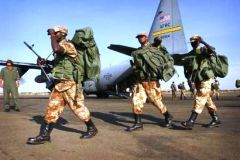Rwandan troops arrive in Sudan’s Darfur region
By Finbarr O’Reilly
EL-FASHER, Sudan, Oct 30 (Reuters) – Rwandan troops arrived in Sudan’s remote Darfur region on Saturday to join soldiers monitoring a shaky ceasefire there, officials said.

|
|
Rwandan troops arrive on a U.S. Air Force C-130 cargo plane at El Fasher airport in Darfur, October 30, 2004 as part of an expanded African Union peacekeeping effort in the violent region of western Sudan. |
The troops are among around 3,300 due to arrive from several countries in an expanded African Union mission there.
The AU troops hope to help rejuvenate an April ceasefire between rebels and government forces in the region where fighting has driven more than 1.6 million people from their homes and tens of thousands have died.
The 65 Rwandans, with military equipment and food, were flown by U.S. military aircraft, which transported 50 Nigerians to Darfur on Thursday. A total of 237 soldiers are expected to leave the Rwandan capital Kigali for Darfur in the next five days.
They will join some 155 Rwandan soldiers who arrived in Darfur on Aug. 15.
The expanded AU force will support some 150 ceasefire monitors and 300 troops already in the region, and will have a new mandate including some powers to protect civilians.
Previously, the force could only monitor the ceasefire.
The Nigerians expect to deploy another 350 soldiers over the next few weeks. Other troops are expected to be sent from other, as-yet unspecified countries.
Separately, African ceasefire monitors secured a deal with a rebel splinter group not to attack them, a senior observer said on Saturday.
Anthony Amedoh said he had met with two senior leaders from a splinter group recently blamed for attacks in Darfur.
“We told them we are not their enemy and that they should not attack us,” he said in the African Union mission’s base in North Darfur state. “I think they will respect their word,” he told Reuters.
“(But) it definitely means there is another rebel group and it will slow things down and the conflict is going to spread.”
Two main rebel groups, the Sudan Liberation Army (SLA) and the Justice and Equality Movement (JEM), signed the truce in April and are holding talks with the government in the Nigerian capital Abuja.
The splinter group, the National Movement for Reform and Development, is not represented at the talks and was not a signatory to the April ceasefire. It split from JEM in April.
Amedoh also said even the enlarged AU force was not enough:
“We need more than the number we are going to get. Even the full 3,000 is not enough but it will be a big help,” he said, adding that the wider presence of troops on the ground would act as a deterrent to the warring parties.
“When we arrived, fighting broke out between the Janjaweed and the SLA and fighting is still going on.”
After years of skirmishes between Arab nomads and mostly non-Arab farmers over scarce resources in arid Darfur, rebels took up arms early last year accusing Khartoum of neglect and of using Arab militias, known as Janjaweed, to loot and burn non-Arab villages, a charge the government denies.
Amedoh said the SLA had taken 11 Arab civilians hostage near Zalingei town in West Darfur state, which he called a serious violation of the ceasefire.
He said the SLA was supposed to hand the hostages over to the AU on Saturday.
(Additional reporting by Arthur Asiimwe in Kigali)
